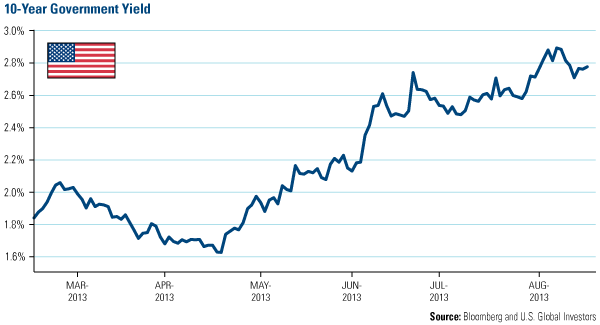The Economy and Bond Market Radar (September 2, 2013)
Treasury yields moved lower this week. This was particularly true for the long end of the yield curve. The market continues to wait for the Fed to begin “tapering” at the September 17-18 FOMC meeting and this week economic data did not really change the thinking on this issue. The market driver this week was global geopolitical tensions concerning Syria and whether the U.S. and/or its allies would “punish” the Assad regime for using chemical weapons. This caused a flight to quality into U.S. treasuries, sending yields lower on the potential for broader ramifications in the region should a strike occur.
Strengths
- Second quarter GDP was revised higher to 2.5 percent, up from the originally reported 1.7 percent. This upward adjustment was related to more exports and fewer imports than were previously estimated.
- China’s industrial profits jumped 11.6 percent in July, potentially signaling the economic recovery is really underway.
- The Mortgage Bankers Association’s purchase activity index increased for the second week in a row. This is the first back-to-back positive reading since April.
Weaknesses
- Durable goods orders unexpectedly fell 7.3 percent in July, well below estimates. That was the biggest drop in almost a year and adds to the uncertainty regarding quantitative easing (QE) tapering.
- Housing data has shown mixed results recently but home price gains slowing and pending home sales declining in July.
- Rising inflation, depreciating currencies and weak growth in many emerging market countries are putting pressure on policy makers to act.
Opportunity
- Despite recent conflicting commentary, the Fed continues to remain committed to an overall accommodative policy.
- Key global central bankers are still in easing mode, such as the European Central Bank (ECB), Bank of England and the Bank of Japan.
- The recent selloff in bonds is likely an opportunity as higher yields will act as a brake on the economy and potentially become self fulfilling, thus postponing Fed action.
Threat
- Inflation in some corners of the globe is getting the attention of policymakers and may be an early indicator for the rest of the world.
- Trade and/or currency “wars” cannot be ruled out which may cause unintended consequences and volatility in the financial markets.
- The recent bond market selloff may be a “shot across the bow” as the markets reassess the changing macro dynamics.















